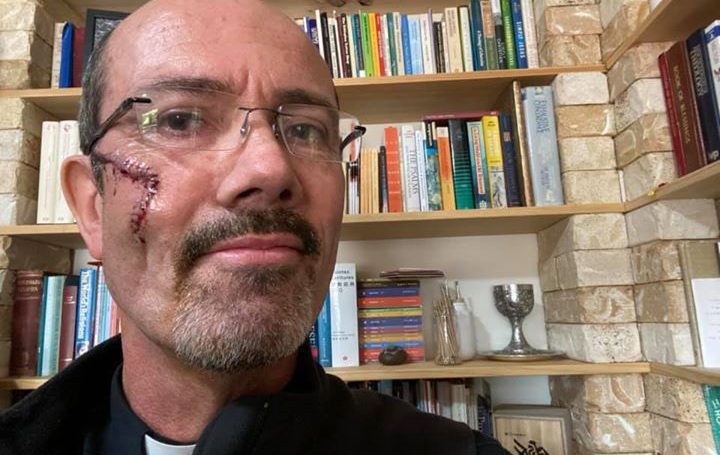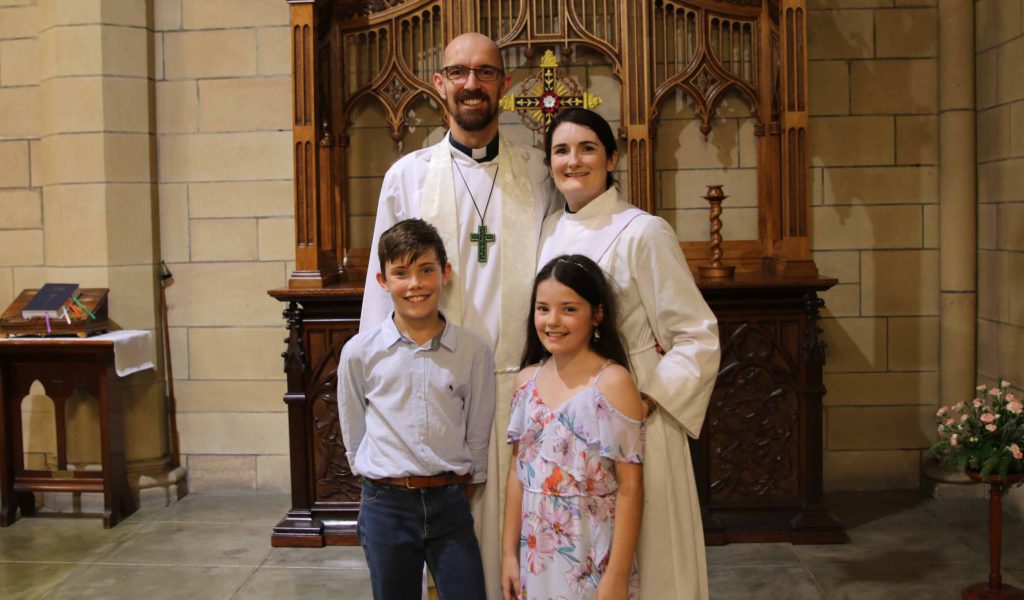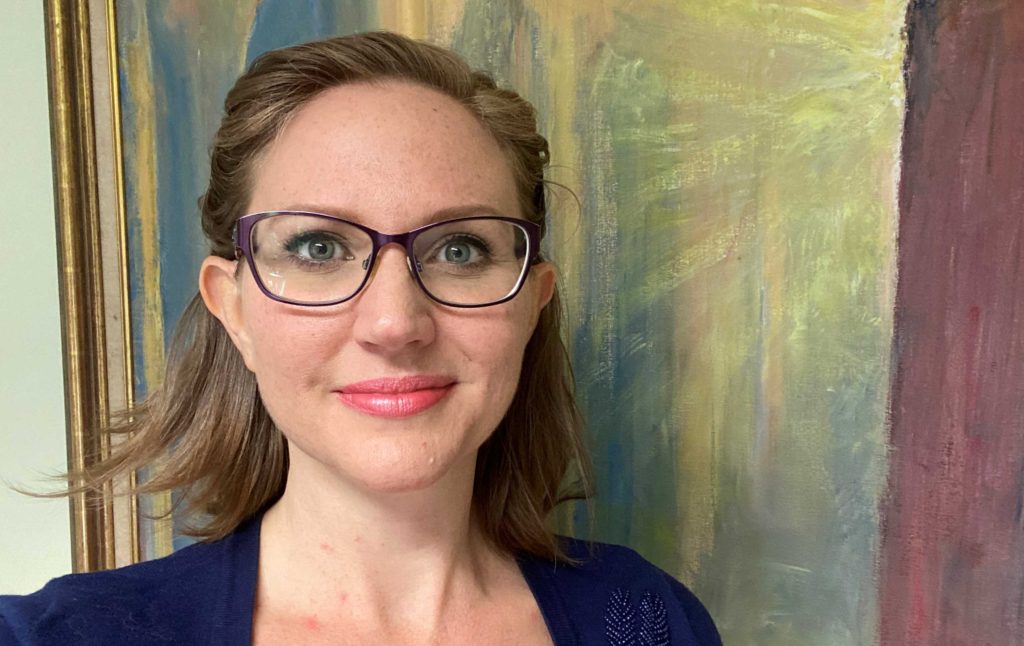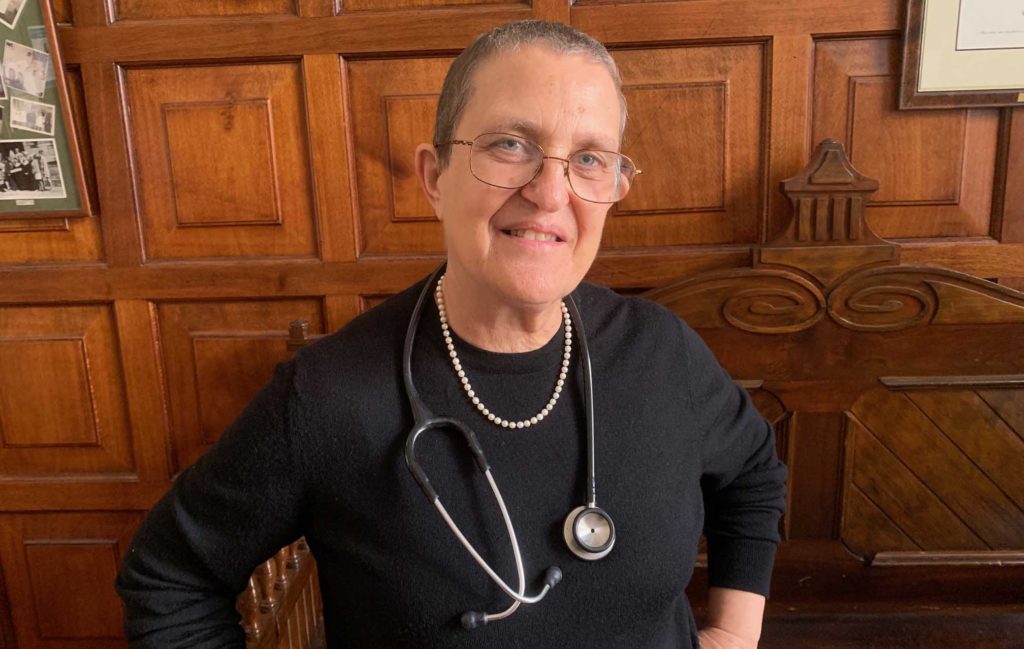The power of sharing stories
Features
When Bishop Cam Venables had a skin cancer removed from his cheek in late July and subsequently shared about his experience online, the unexpected flow-on effects for other local Anglicans were significant – hear what Bishop Cam and others in our community have to say

When Bishop Cam Venables had a skin cancer removed from his cheek in late July and subsequently shared about his experience online, the unexpected flow-on effects for other local Anglicans were significant – hear what Bishop Cam, The Rev’d Chris Bate, Elizabeth McConnell and The Rev’d Dr Ann Solari have to say.
The Right Rev’d Bishop Cam – Bishop for the Western Region
I was born in Northern Ireland 55 years ago and have been blessed with an Anglo-Celtic skin. In the journey of my life I have spent 34 years in the Southern Hemisphere and have loved the people and places I have called home in that time. However, living ‘down under’ in Papua New Guinea and Australia has meant that my skin has seen a lot more sun than if I’d stayed up in the north…and a lot less rain!
Advertisement
Consequently, I get a skin check at the beginning of each year and think it’s a bit like the principle of having your vehicle serviced regularly – you just want to monitor how things are going and address issues as they arise before they become major.
Earlier this year a biopsy from a mark on my face was diagnosed as a squamous cell carcinoma, also known as an ‘SCC’. It’s not the first and I’m fairly confident that it won’t be the last! Anyway, a wonderful surgeon cut the little critter out and because it was on my face, he created a large flap to cover what was removed using 24 stitches to hold it in place.
This initially looked pretty dramatic, as you can see by the above image, and inevitably people noticed. I have to say it’s a strange thing to be in a supermarket and have kids stare open mouthed as you approach while their parents make eye contact briefly before looking away!
Because I present a video session called ‘Live at Five’ to a Facebook community each Sunday and Wednesday afternoon many people quickly became aware of the surgery and I was hugely encouraged by messages of support and assurances of prayer.
Advertisement
But in the weeks following, I was also struck by feedback from some people who said that my experience, and the pirate-like photo, had been a catalyst for them to have their own skin checked. And, that they had been living with an itchy mole or a freckle that had changed colour and had not really thought about getting them checked.
One of these good folk was the Priest-in-Charge of the Parish of Booval, The Rev’d Chris Bate, and I think the experience he described is full of God’s grace…

The Rev’d Chris Bate with wife The Rev’d Juliana Bate and their children Connor and Victoria
The Rev’d Chris Bate – Priest-in-Charge, The Parish of Booval
For the last 18 months, I had been thinking “I need to get a skin check.” But as life goes, things pop up and it kept getting pushed to the back of my mind. On 30 July, Bishop Cam posted a photo on Facebook of his recent procedure to remove a skin cancer.
After seeing this, a loud and clear voice said, “Chris, you need to get checked.” While this voice may or may not have been audible, I knew it was God’s spirit talking to me.
Off to the doctor I finally went, knowing there was a spot on my back which concerned my wife, Juliana. However, the doctor spotted a small spot on my left ribcage that concerned him, and so on 25 August he removed it. A week later the biopsy results were back, and they weren’t good – a Stage 2, nearly Stage 3, melanoma. This led to more skin being removed from the same spot on 11 September. Thankfully, the next lot of results came back clear, and the doctor was confident that “we got it all”.
Nonetheless, the doctor wanted to remove the spot off my back, too. This one came back all clear, but with signs the cells were starting to mutate. A good thing it was removed! My doctor thinks that because of my age (only 35), “I am a scary man”. After all of this, I’m waiting to see a specialist later this month to find out the next steps for my skin.
I expect to be on a long journey with my skin and skin cancer. My grandmother died at 50, two weeks after I was born. What started as a melanoma for her turned into the brain tumours that took her life. This has played on my mind during this time, but I am reminded of Psalm 121: ‘I lift my eyes to the hills; from where is my help to come? My help comes from the Lord; the maker of heaven and earth.’
I am so thankful to God and for his grace at work through all of this, especially the witness of Bishop Cam as he shared his story. Without that prompting, it may have been another year, and who knows what could have happened. Like Bishop Cam I am now a huge advocate for getting skin checks, especially for younger people. You just don’t know when a seemingly small spot may actually be cancer.

Elizabeth McConnell is a formation student and pastoral care practitioner
Elizabeth McConnell – Formation Student and Candidate for the Diaconate
For (literally) years I had, “Make appointment with a skin specialist” on my to-do list. I would look at the list and every time I saw it think, “Oh yes, I must do that…” and of course, it was never done.
I have the skin you’d imagine of a country girl with a fair complexion running around in the 80s and 90s, rarely wearing hats or applying sunscreen. I’m covered in freckles and have lots of moles. I used to be pretty good at keeping an eye on them with my GP, but the practice slipped around the time I had my first child more than a decade ago.
This year, I saw Bishop Cam’s post pop up on Facebook showing a big cut on his cheek where he had a skin cancer removed. It was a pretty shocking image! It reminded me again that “I really must make that appointment.” But, I still didn’t make the call. It wasn’t until Chris Bate had his skin check and a melanoma was found that I was jolted out of my complacency and I finally made the call to have my skin checked.
The doctor who looked at my skin was very professional and quick. Knowing what he was looking for meant that each spot was assessed quickly before moving on. I was in and out in less than 15 minutes. Everything is fine, apart from one spot on my forehead. Out of all the spots on my body which are shaped weirdly, raised, larger than 5mm etc, this one is a small, perfectly round, non-receded and unassuming spot that the doctor told me requires monitoring.
It has markers of pre-cancerous skin spots and at the moment is fine, but without monitoring we could miss the moment it turns and I could end up with a very big problem. So, the next specialist appointment is already booked for next year. I won’t be letting this fall by the wayside again.
I am very thankful that both Bishop Cam and Chris were willing to share their stories on Facebook, as these gave me the nudge I needed to get checked.

The Rev’d Dr Ann Solari is a GP and Honorary Cathedral Deacon
The Rev’d Dr Ann Solari – General Practitioner and Honorary Cathedral Deacon
Due to our warm and sunny climate, Queensland’s lifestyle can lend itself to high levels of sun exposure. It’s no surprise then that Queensland has the highest rate of skin cancer diagnosis in the world.
Skin cancer can be deadly, but if found early it is often curable. At least two in three of us will develop skin cancer before the age of 70. The good news is that 95 per cent of skin cancers can be successfully treated if detected early.
Those of us with fair skin, blue or green eyes, fair or red hair or lots of moles or freckles are at higher risk of developing skin cancer. Cumulative UV exposure also contributes to our risk. Anyone who grew up in Australia, works outdoors or spends lots of time in the sun should take extra care to protect and check their skin.
Skin cancer is not just a disease of older people. In fact, melanoma is the most common cancer in young Australians aged 15-39, and it kills more Australians aged 20-39 than any other single cancer.
It is important that we all check our skin regularly. We need to get to know our skin and take immediate action if we notice any changes. We all need to get familiar with our skin because it is the best way to notice changes possibly linked to skin cancer.
Annual skin checks with a GP or specialist are essential; however, as we are the people who see our skin every day we need to take responsibility for knowing our skin – doing so can be lifesaving. If we notice a change or a new spot, we should show our GP as soon as possible. The GP may look at the spot with special equipment, take a biopsy or refer us to a specialist skin doctor for further investigation or treatment.
There are many useful resources which show us how to check our skin. It is worth looking at the Cancer Council and Queensland Health websites, as well as talk to our doctors. Apps like Miiskin can help track moles over time and this SunSmart ‘Spot the difference’ resource is useful for printing and putting on the kitchen fridge as a visual reminder at home.





